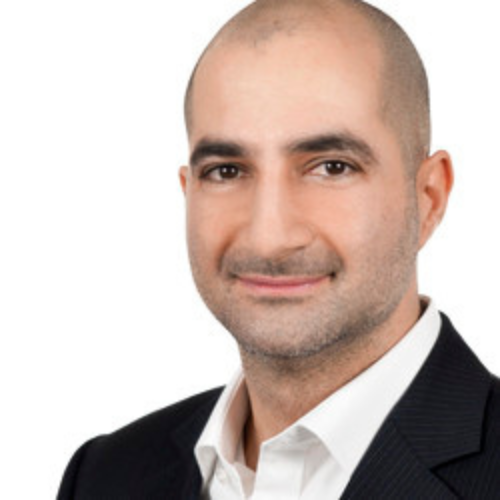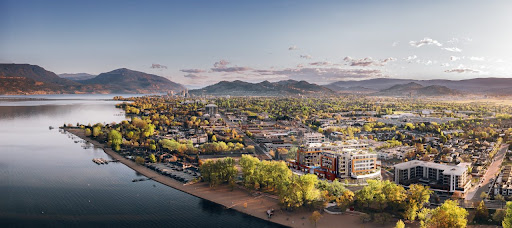Episode 386 – August 24, 2023
Listen On: Apple Podcasts | Spotify | Google Podcasts
Guest Information

Hani Lammam
Hani Lammam serves as the Executive Vice President of Cressey Development Group, overseeing its business development and initial project ideation. Since embarking on his real estate journey in 1997, Hani has been instrumental in a variety of developments, including retail, office, hotel, and land projects. His contributions have led to the creation of numerous market and non-market residences, spanning single-family homes, townhouses, and both condominium and rental apartments. Currently, Hani is focused on enhancing housing affordability, navigating the myriad challenges and intricate regulations in the sector.
Episode Summary
Cressey’s Hani Lammam drops by the studio to break down the dark days of Vancouver real estate. Which sector of the commercial market is in trouble? Will we see more supply on the residential side? And what happens to new construction if developers aren’t making money and investors aren’t coming to the table? Buckle up for a potential nightmare scenario for Vancouver real estate!
Keep your finger on the pulse of Vancouver’s real estate market with our Live Wire email newsletter.
Who is Hani Lammam?
I was born in Lebanon and my family moved to Vancouver when I was 15. I went to UBC and lived in residence during my first year, then rented houses on the west side with my buddies. And I never went back!
It was the late 80’s when we arrived. So it was during a high interest rate time but at 15, I was clueless. At UBC, I studied engineering but realized it wasn’t the right path for me. I did a masters in project management and construction, which led me to real estate development.
I was a labourer on construction sites in high school and through university; it’s how I paid for school. It’s very rewarding to work with your hands. I grew to love that.
Before I joined Cressey, I was working with a smaller developer and we were partners with Cressey. That’s how I got introduced to the family. I think I impressed them on a project we did together so I went in and asked them to hire me. They did, and here we are 22 years later!
Keep your finger on the pulse of Vancouver’s real estate market with our Live Wire email newsletter.
How is the market right now?
These are definitely challenging times. At the end of the day, Vancouver is a great place to live and work. We are always going to have decent demand. But right now with the dramatic shift in interest rates, we’re seeing the impact on real estate values. Everything is in flux today.
Nobody knows where values should be. All of the deals we saw a few years ago were based on the assumption that you could get cheap financing. But now that financing is more expensive, it’s harder to determine what the value of the underlying asset is. There haven’t been enough transactions in the last year to determine what cap rates should be.
When do you expect we’ll have a conclusion on what assets are worth and what cap rates should be in the commercial market?
I don’t think there’s an easy answer. There’s a lot of patience in the market. The big landlords are going to try and stick it out and the lenders are prepared to wait too.
Is it the same story in the residential market?
On the ownership side, I’m quite surprised by the resilience of the market. I’m amazed at the values that are achieved and have been for some time. It goes back to Vancouver being a great place to live and a confidence in demand.
It comes back to supply. The geographic constraints of Vancouver contribute to our supply limits but add to that government policy and it really chokes supply.
The demand is voracious. It’s hard to understand the impact of half a million new Canadians, which is fantastic for our marketplace. Everyone thought the foreign buyer tax would reduce demand but it didn’t because Vancouver is just such a great place to live.
Have commercial investors left the market?
Investors are looking for yield and they have options. They can invest in real estate all over the world. There are opportunities in Vancouver and different sectors they can invest in. Each sector has its own characteristics and follows different market cycles.
Is there a sector that is outpacing the others in the commercial market?
The strongest sector of the commercial market today is probably retail, but not all retail is good. Full service restaurants are struggling, likely due to labour costs.
Industrial remains strong with high demand, but affordability is an issue. Rates are triple what they were 10 years ago. Office is in a tough spot today with remote work and value issues. It’s not a desirable place to be.

Will the office market recover?
Absolutely. In our business, we were back to the office after six weeks. It’s the nature of our business to collaborate and work in person. I can confidently tell you that if you’re working from home, you’re less productive.
How has Cressey’s strategy changed?
We are staying the course. The company has been around for over 50 years and we have a strong asset base that supports our activity. It’s income-producing and cash-flowing, which allows us to make it through, along with patience and discipline.
At the height of the market when we saw record-setting prices for land, we chose not to participate in that. We had a long term vision. We’re a bit more conservative in our underwriting criteria. So we’re not holding land or non cash-flowing assets that are overpriced.
Does today’s market remind you of another time in Vancouver real estate history?
No, it doesn’t. I’ve been in this business for almost 30 years and this makes me think of the horror stories I used to hear about real estate.
When I started in real estate, no one wanted to be a part of it. It was leaky condo days and everyone was going into tech. I’ve stuck with it and enjoyed the journey, but it does seem like the dark days. Structurally, something is broken and that goes back to interest rates.
Keep your finger on the pulse of Vancouver’s real estate market with our Live Wire email newsletter.
When do we get back to normal?
What is normal? Normal is not 2% interest rates. Maybe normal is closer to 4%. The deals that were done that relied on low interest rates are going to be in trouble. Pain will be felt on those deals. But the market as a whole will be strong again because of the demand.
That will create opportunities. Folks who have the capital to react to those opportunities are going to benefit.
Will supply increase over the next couple of years?
My belief is that supply will not increase dramatically over the next couple of years because municipalities can’t get out of their own way. There is a mindset among municipal staff that they have to protect affordability but the policies that purport to do that actually hurt supply.
Government policy is making housing so unaffordable. Misdirected actions are working hard to limit the ability of investors to prosper off of residential real estate, which means you’re not attracting capital to residential real estate. That means capital goes elsewhere and housing doesn’t get built.
Investors want return but they also want safety and reliability. Vancouver is seen as a safe haven. People will invest here and take a lower return because it’s safe, but how much lower will they accept?
Is the last half of 2023 a good time to invest in residential real estate?
I generally don’t speculate or try to forecast. There’s just too much beyond our control. I would never tell anyone when a good time was to make an investment.
But I would say, as long as it’s a long term investment, you’re pretty safe buying anything. You want it to be of a certain quality that you would be fine to live in, because that’s your end market.
What areas of the Lower Mainland are you excited about?
You have to look at renewal – that’s where you’ll find the greatest appreciation in capital investment. If you buy a condo on the west side, it’s expensive and will always be. You won’t see a jump in value. But if you buy a condo on Fraser St, there’s an opportunity for it to get better. It might take a while and not all neighbourhoods have an opportunity to get better.
Earlier in my career, there was a big push to redevelop neighbourhoods around the Downtown Eastside. That didn’t work out. Not because of lack of good intentions but there were just so many pressures. We’re socially minded and we don’t just want to just put folks on buses and ship them away.
Keep your finger on the pulse of Vancouver’s real estate market with our Live Wire email newsletter.
What are your thoughts on transit-oriented projects?
My struggle with transit-oriented projects is the scale. Municipalities are requiring that every project have retail, office, residential, rental, etc. That makes the projects more complex, more difficult to execute and more risky. They become more investment-oriented than end-user driven because you need the capital to get them built.
We’ve been seeing less gaps in pricing around the Lower Mainland. Is this the new normal?
When we look at values in East Vancouver and Surrey, we’re noticing there’s no spread. There’s also a supply issue.
Downtown isn’t the draw that it used to be. You don’t have to work downtown. People aren’t choosing to be on transit because they have to get downtown. These transit-nodes are their own communities. It isn’t the case that everyone is trying to get downtown anymore.
What would you recommend someone invest in in the commercial market in the next six months?
I would recommend investing in retail strata but you’ll need a lot more capital now that financing isn’t as plentiful. Your mortgage will be smaller. Keep in mind that in commercial, you need capital to attract a tenant. You may have to help a tenant out with improvements, wait while they build out their space, deal with vacancy issues, etc. It costs money to get spaces leased.
How have lease agreements changed in the last few years?
Sophisticated landlords have their leases and they stick by them. At Cressey, we don’t negotiate our lease. With us, you know what you’re going to get and you know you’ll be treated a certain way. With a smaller landlord, you want to be careful and ensure you’re protected.
Does Cressey look to other global cities for inspiration?
Vancouver has been a leader in the development space. We have really good developers in this town who have gone abroad and built elsewhere. We’re definitely a leader in the North American context. I haven’t travelled enough to be a good judge outside of North America.
These days, it’s less about design and more about how we achieve affordability. That’s what we research more than anything else. How do we help with the supply crisis and the affordability crisis?
How is Cressey thinking about the affordability challenge?
Vancouver is our home. We want to see this city flourish and do well.
If we can’t achieve affordable housing and plentiful supply, we’re not going to be able to attract the folks that make Vancouver so wonderful. If workers can’t live here, we can’t have a great city.

Are there other areas in BC that you’re excited about?
Cressey is more focused on Greater Vancouver. We don’t have a plan and we don’t set targets. We react to opportunities.Kelowna is a growth market so we keep our eyes on Kelowna. We’re looking for population growth.
Do forest fires and other effects of climate change factor into your strategy in Kelowna?
Unfortunately, it’s something we need to learn to live with. We have fires in BC but there are fires everywhere. It’s not preventing anyone from making decisions about where they buy recreational property.
What happens in the residential market in the next 6-12 months?
I don’t try and speculate so I make decisions based on today’s costs, today’s revenue and today’s rates. If you take that into consideration, you’ll be fine. As long as you stay disciplined and base your underwriting on that day’s parameters, you will be fine.
That being said, I think you can assume price stability in the next 6-12 months. There will be swings up and down but I think they’ll be minor. The market is going to be driven by end-users and we’ll see less investor activity. As long as the product is family oriented, you’ll see good absorption. Your product needs to meet the demand of new families and of downsizers.
You have to remember that pro formas and budgets are prepared so far in advance. We’ve had rates increase but we’ve also seen costs dramatically increase. I think we’ll see a lot of these projects that are underway right now being built for no developer profit.
How do we finance new construction if developers aren’t making money and investors aren’t coming to the table?
Exactly! That’s the concern. If you look at Cressey’s pipeline, you’ll see that there are no high rises right now. And that’s because of this concern. If we want to see high rises being constructed, we need to make it attractive for developers and investors. And I put that on the shoulders of the government.
When you put in something like the foreign buyer ban, you are wiping out a big pool of those investors. That’s very short sighted and, in my opinion, stupid. Unfortunately, it’s hard to reverse policies like that.
Keep your finger on the pulse of Vancouver’s real estate market with our Live Wire email newsletter.
The 5 Wire: Getting to Know Executive Vice President of Cressey Development Group, Hani Lammam
One book you recommend
I don’t read much. I love reading but I just don’t have a lot of time. I do spend quite a bit of time reading contracts and leases. I have The Daily Stoic by Ryan Holiday on my bedside table. It’s half a page and I just read one each night before bed.
What new habit, behaviour or belief has most improved your life?
I don’t really introduce new beliefs but I fine-tune things. The biggest change in my life of late has been podcasts. I recently started listening while I walk the dogs. I’ve been learning lots!
What have you been binge watching lately?
I’m watching Dark Winds which is an Indigenous drama.
Favourite band?
I grew up in the glam rock days, so I’m a big Def Leppard and GNR fan.
What have you purchased recently for under $1500 that has had a positive impact on your life?
I recently bought airpods. I resisted for a long time because it drives me crazy when people have them in. But I finally gave in and now I listen to podcasts with them while I walk the dogs.
Keep your finger on the pulse of Vancouver’s real estate market with our Live Wire email newsletter.
Episode Host

Adam Scalena
Adam is a full-service realtor, specializing in Vancouver’s best areas. His systematic approach to real estate and dedication to his clients has consistently placed him within the top 10% of realtors operating within Greater Vancouver.

Matt Scalena
Matt is real estate obsessed and considers himself a lifelong student of the Vancouver real estate market. As a co-manager of the Scalena Real Estate team, Matt prides himself on expertly advising buyers and sellers on all aspects of the fast-paced, dynamic Vancouver real estate market. He is present at every stage of the process, from that first phone call or email right through to when keys are exchanged between sellers and buyers.







